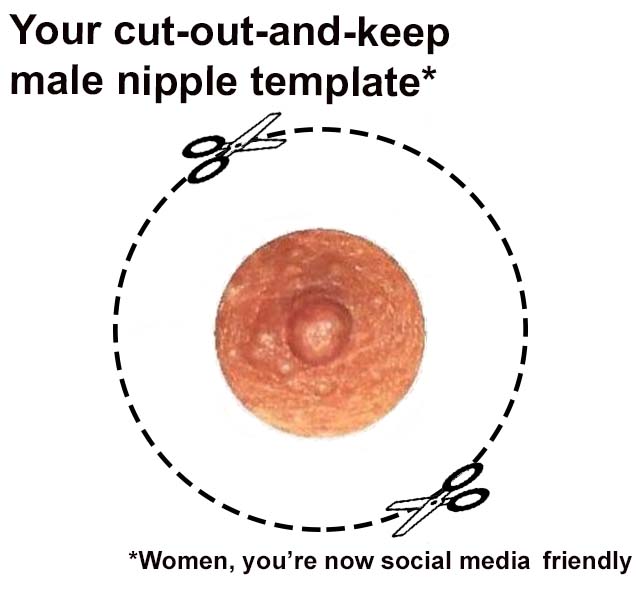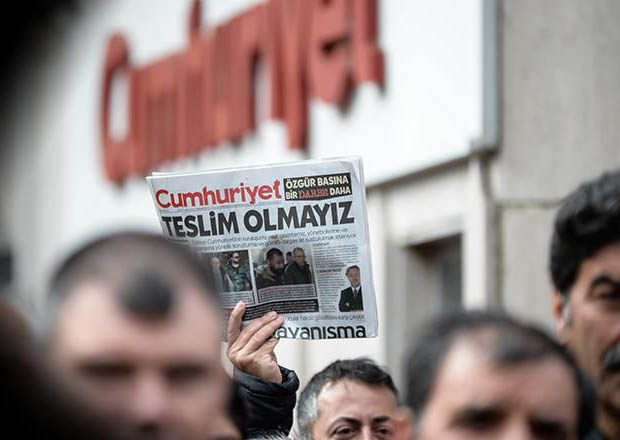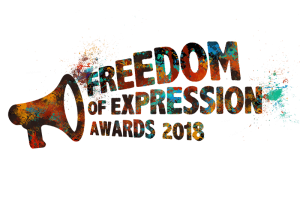18 Sep 2017 | News and features, Volume 46.03 Autumn 2017 Extras
[vc_row][vc_column][vc_custom_heading text=”In the Autumn issue of Index on Censorship magazine, we explore the censorship of the female nipple, which occurs offline and on in many areas around the world. We speak to photographers and magazine editors who are covering up and the women who are fighting against it, one nipple at a time.”][vc_column_text]
Part of the controversy lies in the double standard. Male nipples are totally fine, despite little to no difference in their appearance. With that in mind, we present to you a male nipple. You can cut this out and put it over a female nipple. Your nipples will then be ready to go out in public.
You can read more about the latest issue of the magazine here.
[/vc_column_text][/vc_column][/vc_row]
14 Sep 2017 | Mapping Media Freedom, News and features, Turkey
[vc_row][vc_column][vc_column_text]
The trial of Cumhuriyet journalists and executives resumed on 11 September. The Istanbul 27th High Criminal Court issued an interim ruling to keep five defendants in prison.
These are: editor-in-chief Murat Sabuncu, president of the Cumhuriyet Executive Board and lawyer Akın Atalay, columnist and publications advisor Kadri Gürsel, reporter Ahmet Şık, accountant Emre İper and Ahmet Kemal Aydoğdu — a teacher unrelated to Cumhuriyet who is on trial on the basis of tweets he made — will remain under arrest.
The interim decision was in keeping with the prosecutor’s request for the continued imprisonment of the suspects on the grounds that the suspects might “obscure evidence” and are a “flight risk”.
“The charges holding Cumhuryiet journalists in prison a political attempt to silence one of Turkey’s oldest independent media outlets,” said Hannah Machlin, project manager for Index on Censorship’s Mapping Media Freedom project. “The decision to keep the five staff members behind bars is shameful yet indicative of Erdogan’s regime disregard for fundamental human rights.”
Emre İper, an accountant for Cumhuriyet who was arrested on 19 April on charges of using ByLock — an encrypted messages app allegedly used by the Fethullah Gülen network, the groups the Turkish authorities say was behind last year’s coup attempt — delivered his defence statement for the first time. Rejecting the allegation that he used ByLock, İper denies both that he used ByLock and that he is a member of a terrorist organisation.
“I would rather be held for an entire lifetime without any questioning than be held on FETÖ charges for just a single day,” he said. FETÖ — an acronym for Fetullahist Terrorist Organiation– is the name used for the Fethullah Gülen network by Turkish authorities. “I would like my acquittal from this shameful accusation,” he added.
Witnesses whose statements were included in the indictment delivered testimony in the trial. The session, which began at 10.30am, lasted until late in the evening.
Witnesses included İbrahim Yıldız, former editor-in-chief of the newspaper, its current news coordinator Aykut Küçükkaya, former Cumhuriyet Foundation board member Nevzat Tüfekçioğlu, Cumhuriyet reporter Miyase İlknur, Cumhuriyet columnist Şükran Soner, Cumhuriyet Foundation’s former accountant and executive Mustafa Pamukoğlu and former Cumhuriyet Foundation executive İnan Kıraç.
Most did not testify against the defendants, saying that they had voiced criticism of how the foundation was managed but did not agree with the terror charges levelled at the defendants.
Journalist Kadri Gürsel, who spoke at the hearing, said his defence statement was ignored by the authorities, asserting that his right to a fair trial had been violated.
He also denied claims that he had talked to people who used ByLock. He said most of these accusations stemmed from calls or SMS messages received from ByLock users, whose calls had gone unanswered.
Phone records also show, Gürsel said, that the last ByLock user who called him had phoned him six-and-a-half months prior to his employment at Cumhuriyet.
“I think I might be the only person under arrest in these media trials who was locked up for having been contacted by people who used ByLock,” he said. “The reason why I am being tried here is not because ByLock users contact me; it is because I am a critical journalist. I am being tried for my thoughts and journalistic activities. My only hope is for a fair trial.”
“I have a clean conscience regardless of what decision comes out of this trial,” Gürsel added.
Murat Sabuncu said he had spent ten-and-a-half of the 12 months he served as editor-in-chief in prison. He said the expert witness of the prosecution had never worked as a journalist and whose age was the same as the number of years he worked as a journalist.
“This trial will go down in the history of free speech as a dark stain,” he said. “We will continue to defend free speech for all journalists in Turkey, even if we spend more time in prison.”
Cumhuriyet reporter Ahmet Şık said: “I was arrested on charges of spreading propaganda for FETÖ, Revolutionary People’s Liberation Party Front (DHKP-C) and the Kurdistan Workers’ Party (PKK), and later my case was merged with this trial. The public likely thought it was being taken for a fool because of the FETÖ allegation and so this charge was dropped and I was officially charged with spreading propaganda for the PKK and the DHKP-C.”
Akın Atalay, who also spoke in the trial, said the case was a clear “picture of the democratic level Turkey was taken to.”
The trial was adjourned until 25 September. The next hearing will be heard at the Çağlayan Courtroom in central Istanbul. The presiding judge said remaining witnesses will be heard in the next trial, after which the court will be able to make a “sounder decision.”[/vc_column_text][/vc_column][/vc_row][vc_row][vc_column][vc_basic_grid post_type=”post” max_items=”4″ element_width=”6″ grid_id=”vc_gid:1505391157742-86c58a19-9172-3″ taxonomies=”8607″][/vc_column][/vc_row]
13 Sep 2017 | Press Releases

Index on Censorship ouvre les nominations à sa bourse pour la liberté d’expression 2018
- La Bourse récompense journalistes, activistes, activistes numériques et artistes qui combattent la censure à travers le monde
- Les boursiers reçoivent une aide d’un an
- Soumettez une candidature sur indexoncensorship.org/nominations
- Les candidatures sont ouvertes du 5 septembre au 8 octobre
- #IndexAwards2018
Les nominations à la bourse de la liberté d’expression Index on Censorship 2018 sont ouvertes. Entrant dans sa 18eme édition, cette récompense honore certains des héros les plus remarquables de la liberté d’expression à travers le monde.
Les gagnants des années précédentes comprennent l’activiste russe Ildar Dadin qui a été libéré de prison après avoir été nominé, les activistes chinois anonymes GreatFire qui ont depuis bénéficié d’un soutien financier important, et le musicien et activiste Smockey qui a reçu de l’aide pour reconstruire son studio au Burkina Faso après sa destruction par un incendie.
La Bourse est destinée à soutenir des activistes à travers le globe. Les vainqueurs des éditions précédentes incluent le caricaturiste syrien Ali Farzat, l’activiste pakistanaise Malala Yousafzai, la journaliste d’investigation saoudienne Safa Al Ahmad et la photographe sud-africaine LGBTI Zanele Muholi.
Index invite le public, les représentants de la société civile, les associations et les médias à nominer des individus ou des organisations qui méritent d’être célébrés et de voir leur travail contre la censure soutenu internationalement.
Nous offrons quatre bourses, une dans chacune de ces quatre catégories :
- Arts, pour les artistes (de tout type) et les producteurs dont le travail combat la répression et l’injustice tout en célébrant la libre expression artistique
- Activisme pour les activistes qui ont eu un impact significatif dans la lutte contre la censure et la promotion de la liberté d’expression
- Activisme numérique saluant des usages innovants de la technologie pour circonvenir la censure et faciliter l’échange gratuit et indépendant d’information
- Journalisme, saluant un journalisme à fort impact, courageux et déterminé (sur tous supports) qui dénonce la censure et les menaces à la liberté d’expression
Tous ceux ayant remporté un prix se voient offrir une année d’assistance directe pendant laquelle ils reçoivent des conseils en formation, en création de réseaux et une assistance 24 heures sur 24. Les 12 mois commencent avec une résidence d’une semaine à Londres (en avril 2018). Au cours de l’année nous cherchons à aider les candidats à perpétuer et à étendre leur précieux travail de défense de la libre expression à travers le monde.
« Non seulement l’attribution des prix de la liberté d’expression assure une visibilité aux personnes et aux groupes dont le travail brillant et valeureux n’a de cesse de promouvoir la liberté d’expression à l’échelle internationale, mais cela consolide également leurs structures et leur organisation », dit Jodie Ginsbberg, PDG de Index. « Ces gens sont de véritables héros. Des gens qui, souvent, doivent faire face à des obstacles considérables et à un danger immense et bien réel dans le simple but de faire valoir leur libre expression. J’incite vivement tout un chacun à nous soumettre le nom de leur champion de la libre expression : il faut s’assurer que leur voix soit entendue. »
La liste des nominés aux prix 2018 sera annoncée fin janvier. Les noms des gagnants seront révélés lors d’une cérémonie de gala en avril 2018 à Londres.
Pour plus d’informations quant aux prix et à la bourse, veuillez contacter [email protected] ou appeler le +44 (0)207 963 7262.
13 Sep 2017 | Mapping Media Freedom, media freedom featured, News and features, Ukraine
[vc_row][vc_column][vc_single_image image=”95583″ img_size=”full” alignment=”center” onclick=”custom_link” link=”https://mappingmediafreedom.org/#/”][vc_column_text]Journalists across Ukraine are being suppressed, deported and banned from the country, according to the Index on Censorship’s Mapping Media Freedom project.
Ukraine has imposed a number of restrictions on the media as a response to Russian propaganda in order to protect its national security.
Mapping Media Freedom correspondent Vitalii Atanasov said that “the deportation of journalists is not an effective and justified response to such challenges and threatens press freedom. It is necessary to develop another mechanism to maintain a truly professional and fair media that could compete with all sorts of propaganda and fake news.”
The conflict has led to a rise in anti-media sentiments across Ukraine with some prominent members of the Ukrainian government branding journalists as traitors. Public opinion has swayed over the course of the conflict and the press is often criticised for showing the problems of Ukrainian society.
“Another disturbing trend is that the authorities and their supporters are promoting the idea of the ‘fifth column’, hinting that critical journalism can be a threat inspired from outside. Unfortunately, journalists are an easy target,” Atanasov said
Journalists operating in Ukraine are being blamed for the spread of classified information and for undermining the Ukrainian army. “There have been several cases when journalists were accused of having published classified information, but in the end, the accusations were not confirmed,” Atanasov added.
With both the public and the politicians demonising the press, it has become increasingly dangerous for journalists to work and operate in the Ukraine. The most extreme example of the dangers the media face in Ukraine is the assassination of Pavel Sheremet in July 2016.
Atanasov said that this has led to some self-censorship in the Ukrainian press. “I can assume that some journalists resort to self-censorship in some cases, as they would like to avoid obstacles and problems for their work in the future.”[/vc_column_text][/vc_column][/vc_row][vc_row][vc_column][vc_separator][vc_custom_heading text=”Media freedom is under threat worldwide. Journalists are threatened, jailed and even killed simply for doing their job.” font_container=”tag:h3|text_align:left” use_theme_fonts=”yes” link=”url:https%3A%2F%2Fwww.indexoncensorship.org%2Fcampaigns%2Fpress-regulation%2F|||”][vc_row_inner][vc_column_inner width=”1/2″][vc_column_text]Index on Censorship monitors media freedom in Ukraine and 41 other European area nations.
As of 11/9/2017, there were 296 verified violations of press freedom associated with Turkey in the Mapping Media Freedom database.[/vc_column_text][/vc_column_inner][vc_column_inner width=”1/2″][vc_column_text]Index on Censorship campaigns against laws that stifle journalists’ work. We also publish an award-winning magazine featuring work by and about censored journalists. Support our work today.[/vc_column_text][/vc_column_inner][/vc_row_inner][vc_separator][/vc_column][/vc_row][vc_row][vc_column][vc_column_text]Recent cases reported to Mapping Media Freedom’s database of European area press freedom violations:
Two Russian journalists were deported and banned from Ukraine this August. The first was Tamara Nersesyan, a correspondent for the All-Russian State Television and Radio Company on 15 August. Shortly after her report on the Ukrainian music festival Bandershtat was shown on Channel One she was deported and banned from the country.
On 30 August, Russian State TV Channel One correspondent Anna Kurbatova was deported. A spokesperson for the Security Service of Ukraine (SBU) Olena Gitlyanska wrote that “Russian propagandist Anna Kurbatova was forcibly expelled from Ukraine… she is forbidden to enter the territory of our state for three years.” The reason stated for deportation was “because of activities, which hurt the national interests of Ukraine.” Information about Kurbatova was published on the Myrotvorets because she was judged to be distributing “anti-Ukrainian propaganda” and to be “manipulating significant information”. In 2016, the Myrotvorets leak shared the names of thousands of journalists accredited in the separatist republics. She had recently reported on the deportation of two Spanish journalists and covered Ukrainian Independence Day for Channel One.
Spanish journalists Antonio Pampliega and Manuel Ángel Sastre were deported from Ukraine. Both had been blacklisted in 2015 but granted access to the country after pressure from Spanish authorities. However, on 25 August an SBU spokeswoman said that the journalists were barred because of their “activities that contradict the national interest of Ukraine,” according to the Committee to Protect Journalists. The pair were deported to the Netherlands after a 20-hour detention in Kiev airport. Sastre said the Ukrainian authorities “treated us like criminals”.[/vc_column_text][/vc_column][/vc_row][vc_row][vc_column][vc_basic_grid post_type=”post” max_items=”4″ element_width=”6″ grid_id=”vc_gid:1505295853750-ecfb674d-953f-9″ taxonomies=”6564″][/vc_column][/vc_row]



